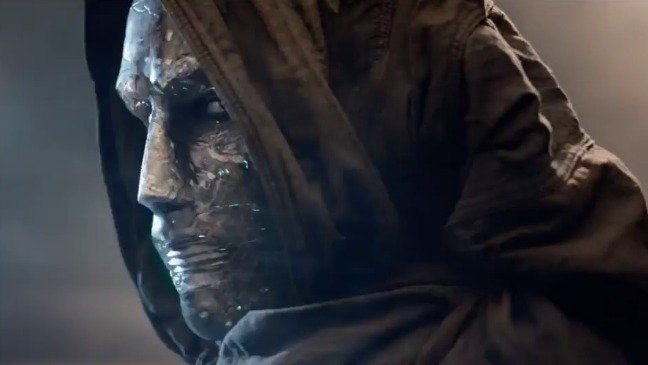The critical “autopsy” on this ambitious but disappointing film has already begun, so let's examine some theories on the “cause of death.”
MAJOR SPOILERS FOLLOW
Lack of Clear Victory
 As I wrote last week on Inside Out, characters that are emotionally thin can still make for compelling stories if they have clear goals and pursue them with all their heart. A major flaw in Fantastic Four is that the only character who expresses a clear goal is Dr. Franklin Storm (Reg E. Cathey).
As I wrote last week on Inside Out, characters that are emotionally thin can still make for compelling stories if they have clear goals and pursue them with all their heart. A major flaw in Fantastic Four is that the only character who expresses a clear goal is Dr. Franklin Storm (Reg E. Cathey).The title characters either never express their goals or pursue them half-heartedly.
- Reed (Miles Teller) says, “I just want to fix my friends,” but takes almost no action towards that goal other than running away.
- Johnny (Michael B. Jordan) claims that he just wants to make enough money to get his car back, but he sticks around the project and needlessly exposes himself to the dangers of “Planet Zero”.
- Ben (Jamie Bell) should have the goal of returning to his normal life, but never expresses it.
- Victor's (Toby Kemmell) objectives are unclear, even when he becomes “Dr. Doom” and rules a new planet. He shows his jealousy of Reed and his desire for Sue, but never pursues the goals of either destroying Reed's reputation or winning Sue's affection.
- Sue's (Kate Mara) motives are as invisible as the rest of her, both visually and emotionally.
Your script needs characters that have clear goals, as well as the desire to push through any obstacle to reach those goals. Without those goals, your characters will come across as dull, lifeless puppets, rather than strong individuals an audience wants to see succeed (or fail) based on their own efforts.
Lack of Strong Antagonist
Another problem with this film is the lack of a strong antagonist. For most of the film, the main antagonist is Dr. Allen (Tim Blake Nelson), who wants to use Ben, Sue and Johnny for the benefit of his Pentagon patrons.Dr. Storm and Sue offer only lip service in resistance, while Ben and Johnny go along with being used as living weapons. Reed goes into hiding and fights off a squad of soldiers, but ends up captured rather easily by Ben.
The final fight scene wants to establish Victor, errr, I mean “DOOM!”, as the Big Bad. After he defeats each of the Quarrelsome Quartet individually, they come together as a team (just like Dr. “Obi-Wan” Storm told them they should) and put down their former colleague with relative ease.
Without a strong antagonist, the main characters have neither the reason nor the impetus to grow out of their comfort zones. They fail to grow and change, leaving them exactly where they started and leaving the audience wondering why they wasted their time watching.
Pacing Issues
The problems with pacing throughout Fantastic Four made it seem less like a roller-coaster ride and more like a long car trip. While many screenwriting teachers have criticized the simplistic screenplay structure taught in books like Save The Cat, at least it teaches writers how to pace their story elements.To borrow a metaphor from a much better Miles Teller film, the first half was “dragging” and the second half was “rushing”. The use of a story framework, whether you call it a “Beat Sheet”, a “mini-movie” or a “seven-act structure”, can help you make sure that your story has a place for everything and everything at its pace.
Lazy Writing
For a screenplay with three credited writers (including the director and producer), as well as a reputed $120 million production budget, the story came across as lazy and half-finished.- On-the-nose dialogue: Too many instances to name, from Dr. Storm's speechifying about uniting humanity and saving the planet, to Reed's “pep talk” of “He's not stronger than all of us,” the script could definitely have used some more subtle dialogue.
- Telling, not showing: Dr. Allen debriefs Ben on his last mission. Instead of showing the fight (as promised in the trailer), the characters talk about it. The “One Year Later” time skip shows them using their powers with ease, rather than showing them struggling to grow into their new abilities.
- Empty characters: A major hole in the script is Sue's weak characterization. The sum total of effort put into her character is that she listens to Portishead. She doesn't even get invited on the boys' inter-dimensional joyride; she only gets dosed with radiation by accident after trying to rescue them.
As a friend of mine is fond of saying, “Everyone in your life is either a blessin', or a lesson.” Screenwriters should take that same attitude toward movies. A movie like Inside Out is a true “blessin'” and shows how powerful a great script can be. Fantastic Four serves as a “lesson” by showing what not to do.
Loyal Reader Discount
Speaking of lessons, if you feel that you need lessons on how to develop your script, Story Into Screenplay is offering a FREE initial consultation sessions during August. The initial consultation will show you how to develop characters, create conflicts, and build story structures.The standard rate for paid session is $50 per hour. However, if you book a paid session in August, your hourly rate will be only $40 per hour. Also, if you book in August, your rate will stay at $40 per hour no matter how many sessions you need. This offer expires September 1, so get in on it now!





No comments:
Post a Comment